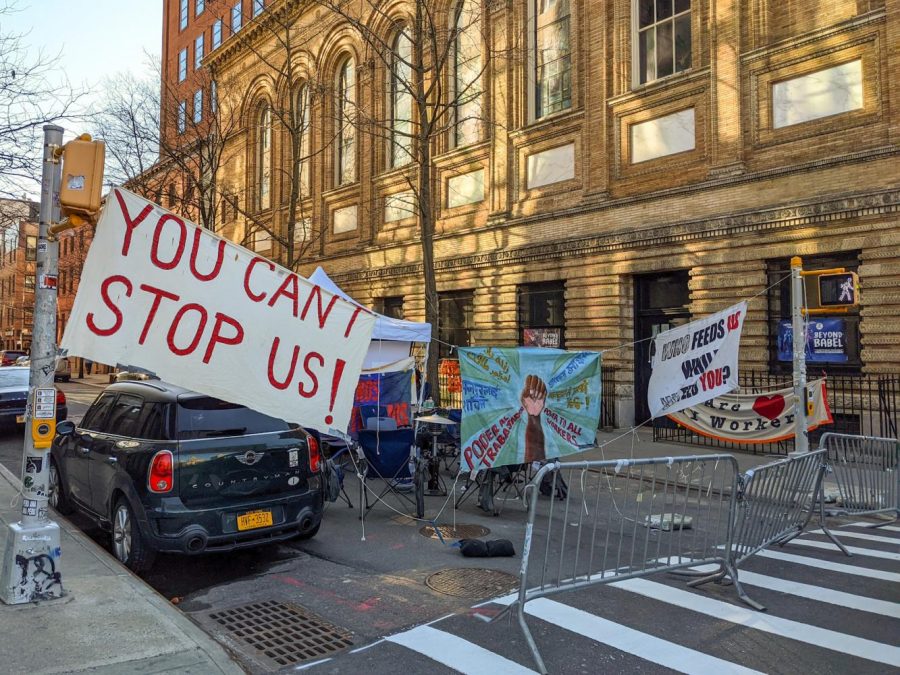Workers excluded from government financial assistance during the pandemic completed their 21st day of an indefinite hunger strike on April 5. The group of strikers, which includes undocumented and recently incarcerated workers, are considered ineligible for unemployment benefits by New York state.
In some cases, the workers were also disqualified from receiving stimulus payments from the recently passed American Rescue Plan of 2021. In addition to stimulus checks, the federal bill provides fiscal recovery funds for state and local governments, unemployment compensation, homeowner and rent assistance, and tax credits to individuals and small businesses.
Julissa Bisono, the co-associate director of organizing at Make the Road New York, emphasized how important the relief funds would be for excluded workers.
“They’re hungry for justice, and they’re worried being hungry,” Bisono said. “Many of them can’t put food on the table … So they’re not leaving until we win.”
The hunger strike was organized by the Fund Excluded Workers Coalition, which is comprised of more than 100 activist organizations from across New York City, including Make the Road New York. The coalition demands that the New York state government allocate $3.5 billion to unemployment benefits for undocumented and recently incarcerated workers. So far, the government has committed to allocating $2.1 billion in funding.
According to a report authored by the Fiscal Policy Institute, a New York-based public policy research organization, 173,000 previously excluded workers would benefit from the funding in New York City alone, alongside over 100,000 other workers throughout the rest of the state.
During the day, strikers, organizers, volunteers and supporters typically assemble at the Judson Memorial Church — which lies across the street from the Kimmel Center for University Life — and at an adjacent tent on LaGuardia Place, where they interact with passers-by and host speakers and musical performances.
Bianca Guerrero, the Fund Excluded Workers Coalition campaign coordinator, said the protesters would continue to fight for the full amount of funding.
“The State Senate and the Assembly have put $2.1 billion on the table, which is a start, but not enough,” Guerrero said. “We need a $3.5 billion fund to make sure that what these workers have received is on par with what other unemployed New Yorkers have received during the pandemic.”
Advocates for expanded funding argue that while Gov. Andrew Cuomo’s administration has allocated a portion of the demanded $3.5 billion, the state has imposed restrictive eligibility requirements — such as government-issued identification cards and pay stubs — which many undocumented workers do not have.
“A lot of the requirements [are] going to leave folks out,” Bisono said. “This money is only going to look good on paper.”
Bisono proposed alternate forms of verification the government should consider while drafting eligibility rules for the proposed funds, including letters from employers, individual tax identification numbers or supporting documents from non-governmental organizations. However, these too may prove difficult to implement because employers could land themselves in legal trouble by admitting they employ undocumented workers.
“At the end of the day, they have to make sure that they give folks options that are really accessible, understanding that the burden shouldn’t be left to them, to prove their hardships, and that they’ve been excluded,” Bisono said.
Since the strike began on March 16, workers in Westchester County initiated a parallel protest. Marcela Mitaynes, a New York state assemblymember, also began a hunger strike in solidarity on March 26. At a rally near the Washington Square protest site this week, Mitaynes stressed the gravity of the issue.
“It’s the difference between [the workers] being able to catch up on their bills or drowning deeper in debt,” she said. “We’re not asking for a lot — we’re just asking to be treated the same.”
Email Arnav Binaykia at [email protected].























































































































































